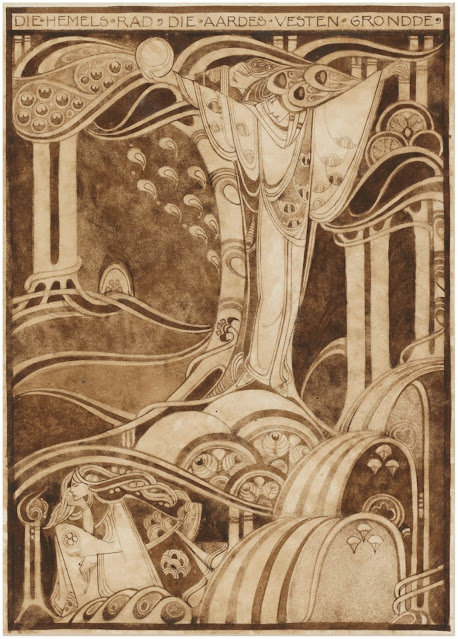.jpg) |
| Willem Arondéus Photo courtesy of Marco Entrop, Het Verzetsmuseum Amsterdam (Dutch Resistance Museum) |
Future hero Willem Arondéus was born in 1894 in North Holland, Netherlands. After a career as an illustrator, he began writing poetry and novels, illustrating many of his books himself. But everything changed with the coming of the Nazis and WWII.
Wikipedia recounts his work with the resistance: In 1942, Arondéus started an underground periodical called the Brandarisbrief. In 1943, the Brandarisbrief merged with another publication called De Vrije Kunstenaar. Through the merger, Arondéus met Gerrit van der Veen, the editor of De Vrije Kunstenaar. In the resistance, van der Veen specialized in forging identity cards. As a result, Arondéus also became involved in creating forged documents, along with lesbian resistant Frieda Belinfante. A major detriment to the success of these forgeries was the Municipal Office for Population Registration as its existence made the forgeries less useful, since their legitimacy could be checked against the registration lists and determined to be fakes. Arondéus and van der Veen, along with a number of associates, developed a plan to destroy the registration office.
Their attack, which took place on 27 March 1943, was partially successful, and they managed to destroy 800,000 identity cards (15% of the records), and retrieve 600 blank cards and 50,000 guilders. The building was blown up and no one was caught on the night of the attack. However, due to an unknown betrayer, Arondéus was arrested on 1 April 1943. Arondéus refused to give up the rest of his team but his notebook was found, and as a result, a majority of the group were also arrested. Belinfante was the sole person from the group to have survived, forcing her to take on a man's identity and go undercover.
On 18 June 1943, Arondéus was tried and sentenced to death by firing squad, along with 13 other men who participated. Two of the group received clemency, but the others were executed on 1 July 1943. Arondéus pleaded guilty and took the full blame, which may be why two young doctors were spared from execution and given custodial sentences instead. Before his execution, Arondéus made a point of ensuring the public would be aware that he and two other men in the group, Bakker and Brouwer, were gay, asking either a friend or his lawyer (accounts vary) to "Tell people that homosexuals are not cowards." (In Dutch: "Zeg de mensen dat homoseksuelen niet per definitie zwakkelingen zijn.")
In 1945, after the liberation of the Netherlands, Arondéus's family was awarded a posthumous medal by the Dutch government in his honour. In 1984, he was awarded the Resistance Memorial Cross. On 19 June 1986, Yad Vashem recognized Arondéus as Righteous Among the Nations.
 |
| December, page from a calendar illustrated by Willem Arondéus, at the Rijksmuseum, Amsterdam, Netherlands |
 |
| November, page from a calendar illustrated by Willem Arondéus, at the Rijksmuseum, Amsterdam, Netherlands |
 |
| October, page from a calendar illustrated by Willem Arondéus, at the Rijksmuseum, Amsterdam, Netherlands |
 |
| Illustration by Willem Arondéus |
 |
| Illustration by Willem Arondéus |
https://en.wikipedia.org/wiki/Willem_Arondeus



No comments:
Post a Comment